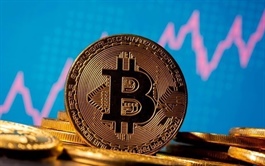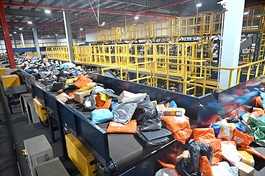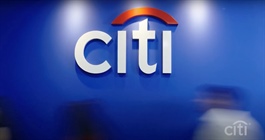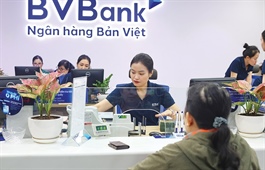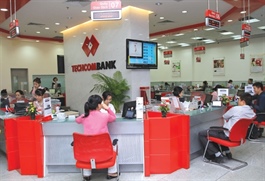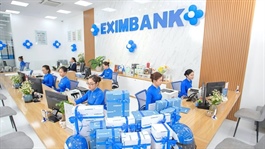Pi Network phenomenon: A closer look at hidden danger
Pi Network phenomenon: A closer look at hidden danger
Though many Pi users are holding thousands of Pi coins, their road to wealth is uncertain, with substantial risks involved.
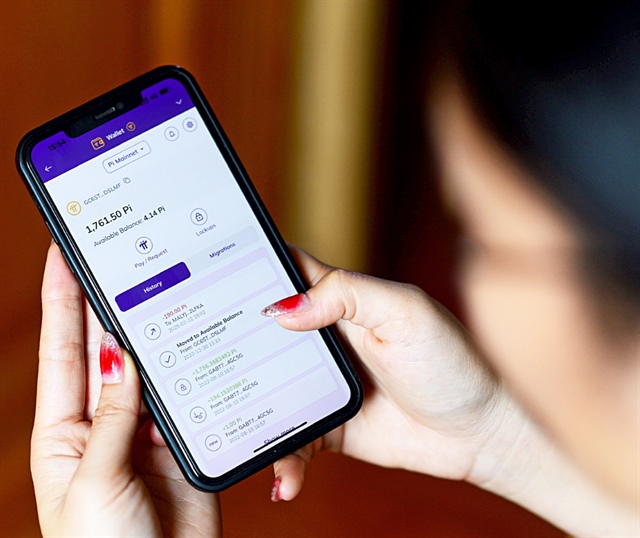
A person holds over 1,700 Pi coins in her account. Photo: Quang Dinh / Tuoi Tre |
Founded in 2019, Pi Network listed the Pi cryptocurrency on exchanges on Thursday at an initial price of US$2 per Pi, capturing widespread attention.
The prices of this cryptocurrency have continuously declined over the past few days.
As of 4:30 pm on Saturday, Pi coins hovered around $0.86 apiece.
Based on Blockchain technology or just a meme coin?
Tran Xuan Tien, vice-chairman and general secretary of the Ho Chi Minh City Blockchain Association, told Tuoi Tre (Youth) newspaper that the majority of Pi coins mined are locked until 2027.
Therefore, selling all the amounts of Pi for cash is currently impossible.
On average, the wallets of users hold a few dozens to several thousands of Pi coins.
Even if converted at the current market price of around $0.86, this amount is not enough to make one a millionaire.
“Many people expect that Pi will rival Bitcoin one day, making them billionaires. However, for that to happen, Pi Network would need to overcome significant technological challenges inherent in any blockchain project,” he noted.
He analyzed that Pi Network operates more like a meme coin -- cryptocurrencies characterized by high volatility, whose value largely depends on online community influence rather than practical utility.
Current trading in Pi Network is centralized and easily controllable. Pi Network runs nodes (electronic devices such as computers, laptops, and phones that can interact and form a blockchain network) under centralized management, meaning the development team can create transactions.
Moreover, Pi Network requires KYC (Know Your Customer) verification to join the mainnet, which is a significant deviation from most cryptocurrencies, where anyone can participate without verifying their identity.
“Identity storage can lead to the risk of data leaks or misuse," Tien explained.
“If an organization controls the KYC process, it can potentially control access to the network. When the value of Pi skyrockets, users could find their ability to sell restricted.”
For those purchasing Pi coins on exchanges in hopes of capitalizing on a price rise, the lack of real-world applications or intrinsic value in the Pi Network makes this a highly speculative and risky investment.
Beware of scam apps mimicking Pi Network
A financial expert told Tuoi Tre that while Pi has been marketed widely, investing in cryptocurrencies always carries potential risks.
In Vietnam, cryptocurrency is not legally recognized as a form of payment or official currency.
As a result, no regulatory bodies oversee transactions, nor are there any government-approved exchange platforms.
Dealing with unofficial exchanges poses significant risks, making users vulnerable to scams.
"Currently, mining Pi is free. However, users must go through multiple steps to unlock their coins, move them into a wallet, and trade them on reputable exchanges. Investors should have a solid understanding of the process,” the expert warned.
Tien also noted that the model of Pi Network could easily be replicated by scammers.
“Instead of being offered free mining, users could soon be enticed into investing money, leading to financial risks, as fraudulent tokens are already appearing on both decentralized and centralized exchanges," Tien cautioned.
“If Pi Network does not issue clear warnings, users might mistakenly trade these fake tokens. Similarly, malicious apps may mimic Pi Network's model to lure users into downloading apps that steal access to their devices."
Hoang Xuan Huong, technology director of cybersecurity company VNetwork JSC, also advised users to be cautious about sophisticated scams.
“Users should be careful when considering investment opportunities in cryptocurrencies, especially those operating under multi-level marketing schemes or other deceptive practices.
“Additionally, fake Pi Network apps containing malware or viruses could steal personal information or even take control of users' devices,” he said.
Meanwhile, D., deputy head of a digital transformation service provider in Vietnam, expressed concerns about certain organizations using deceptive tactics to entice investors with promises of high returns.
However, in reality, they use the money for other purposes, often with fraudulent intentions.
Another risk is the rise of websites imitating Pi Network, which ask users to link their wallets and complete tasks to earn more Pi coins.
Users who fall for these traps could inadvertently give malicious actors full control over their wallets.
What does the law say?
While other cryptocurrencies focus on technological innovation, Pi Network has primarily centered its efforts on community building, which has been evident in its activities over the years.
However, if Pi Network were focusing on becoming a payment system, it would be in violation of Vietnamese law.
Specifically, the government’s Decree 80/2016 on non-cash payments stipulates that virtual currencies are not considered legal tender or a legitimate method of payment.
In addition, Decree 88/2019 regulates penalties for violations related to the issuance, provision, or use of cryptocurrencies as payment instruments.
- 16:04 23/02/2025







